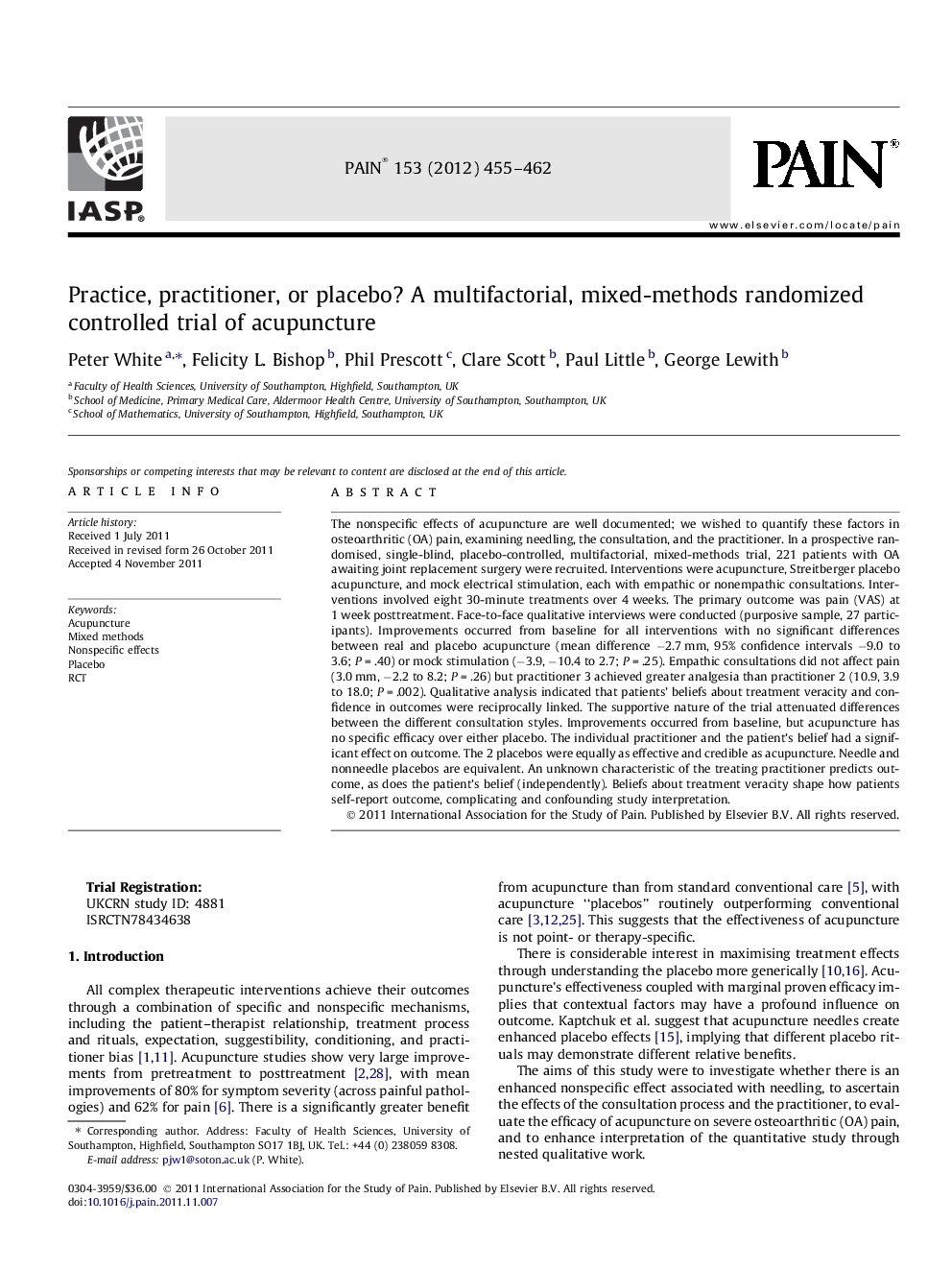| کد مقاله | کد نشریه | سال انتشار | مقاله انگلیسی | نسخه تمام متن |
|---|---|---|---|---|
| 914000 | 918379 | 2012 | 8 صفحه PDF | دانلود رایگان |
عنوان انگلیسی مقاله ISI
Practice, practitioner, or placebo? A multifactorial, mixed-methods randomized controlled trial of acupuncture
دانلود مقاله + سفارش ترجمه
دانلود مقاله ISI انگلیسی
رایگان برای ایرانیان
کلمات کلیدی
موضوعات مرتبط
علوم زیستی و بیوفناوری
علم عصب شناسی
علوم اعصاب سلولی و مولکولی
پیش نمایش صفحه اول مقاله

چکیده انگلیسی
The nonspecific effects of acupuncture are well documented; we wished to quantify these factors in osteoarthritic (OA) pain, examining needling, the consultation, and the practitioner. In a prospective randomised, single-blind, placebo-controlled, multifactorial, mixed-methods trial, 221 patients with OA awaiting joint replacement surgery were recruited. Interventions were acupuncture, Streitberger placebo acupuncture, and mock electrical stimulation, each with empathic or nonempathic consultations. Interventions involved eight 30-minute treatments over 4Â weeks. The primary outcome was pain (VAS) at 1Â week posttreatment. Face-to-face qualitative interviews were conducted (purposive sample, 27 participants). Improvements occurred from baseline for all interventions with no significant differences between real and placebo acupuncture (mean difference â2.7Â mm, 95% confidence intervals â9.0 to 3.6; PÂ =Â .40) or mock stimulation (â3.9, â10.4 to 2.7; PÂ =Â .25). Empathic consultations did not affect pain (3.0Â mm, â2.2 to 8.2; PÂ =Â .26) but practitioner 3 achieved greater analgesia than practitioner 2 (10.9, 3.9 to 18.0; PÂ =Â .002). Qualitative analysis indicated that patients' beliefs about treatment veracity and confidence in outcomes were reciprocally linked. The supportive nature of the trial attenuated differences between the different consultation styles. Improvements occurred from baseline, but acupuncture has no specific efficacy over either placebo. The individual practitioner and the patient's belief had a significant effect on outcome. The 2 placebos were equally as effective and credible as acupuncture. Needle and nonneedle placebos are equivalent. An unknown characteristic of the treating practitioner predicts outcome, as does the patient's belief (independently). Beliefs about treatment veracity shape how patients self-report outcome, complicating and confounding study interpretation.
ناشر
Database: Elsevier - ScienceDirect (ساینس دایرکت)
Journal: PAIN - Volume 153, Issue 2, February 2012, Pages 455-462
Journal: PAIN - Volume 153, Issue 2, February 2012, Pages 455-462
نویسندگان
Peter White, Felicity L. Bishop, Phil Prescott, Clare Scott, Paul Little, George Lewith,